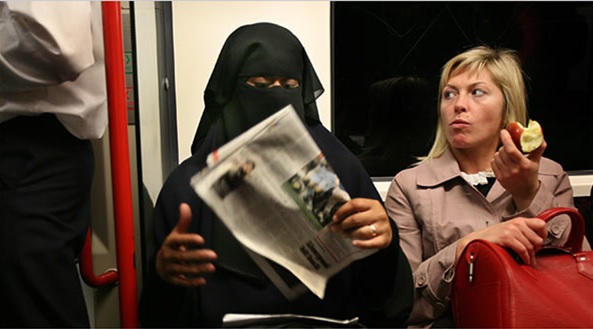The Muslim veil is causing vast controversy within Britain; seen by many as a tool for entrapment of women it remains strongly feared within the British Isles, but is there such need for this fear? Is the generation of this fear due to the misinterpretation, or the lack of understanding, when addressing the complexity of the veil?
The veil today is used as a symbol of the Islamic faith, a faith that is often unjustly stereotyped. It can be argued that the media generates a lot of this stereotyping, often concentrating only on the extremes of the religion and its practices. The question is, why do so many people within the British public accept, believe or support such vast generalisations? Is this through fear? A survey orchestrated by BBC Radio One revealed that that within the general public ‘44% said Muslims did not share the same values as the rest of the population and 60% thought the British public had a negative image of Muslims’. These opinions and ideas have all contributed to the on-going debates: Should the veil be banned in public places, particularly in schools?
This debate has erupted over the past couple of months due to two prominent examples: Firstly, the school in Birmingham which initially decided to tackle the dress codes of hoodies, hats and veils covering ones identity as argued by Brian Lightman (General secretary of the Association of school and college leaders) ‘It is widely understood that teachers and students require full eye contact in the classroom’. However, the school decided to back-track on the proposition and change the rule, due to the fear of protests. This is an on-going debate due to many believing girls and women are forced to wear the veil, and that this contradicts British ideals of freedom and human rights.
The second example is the case of a Muslim woman not wanting to remove her veil in court when facing prosecution. Many people believe that the veil should be removed due to being a piece of clothing that covers one’s identity, in the same way that hoodies or hats are prohibited in courts. The judge, in this case, did rule that the woman had to remove her veil to give evidence, but she was not made to remove it in front of a large court room. This can be argued as reasonable, as noted by Mohammed Shafiq (Chief executive of the Ramadham Foundation) ‘The court case today, for example, there’s a compromise – she can wear the veil, but when she’s giving evidence she has to remove it. There has to be compromise on both sides.’ However, many still argue that the veil should be completely removed when a woman is in court, showing the lack of such ‘compromise’ from various members of the British public.
So, why is it then that there are so many Britons against the veil. and why has it become a prominent debate within British society? The debate over the veil has become a defining factor within society, strongly influenced by the ban of the veil within French schools in 2004. This law was implemented as a way of keeping the ‘French way of life’, and many see this as a step in the right direction – a step which Britain should also be taking. However, does Britain not pride itself on the basis of having a multicultural society? As noted by Amina Ahmed ‘Is it suddenly right to dictate what I, and others, wear in a country that boasts freedom for all?’ Many arguments for the veil to be removed seems to lack the understanding that many Muslim women are not actually forced to wear the veil, but indeed choose to do so as a way of honouring their religion. Many are adamant that the veil is a threat to society, a tool of entrapment of women and a symbol of fundamentalism and yet in a majority of cases this simply is not true!
Whilst the controversial debate shall continue to thrive, it is important for the fear of the veil and its symbolism to be reevaluated, and for misunderstandings and ignorance to be tackled. Britain as a country prides itself upon being multicultural, and thus vast generalisations about the veil should cease to exist. For many Muslim women in British society, and in many places across the globe, wearing the veil is a choice, similar to a Briton choosing what clothing to wear. A brilliant summary of this is provided by Ameena Blake, Vice president of the Muslin association of Britain, who states: ‘Are women who wear the niqab, or face veil, really a threat to national security any more than a nun or any other individual who chooses to dress in a way that is maybe not the same as the majority of people?’ I think we can all agree that this provides powerful food for thought.

